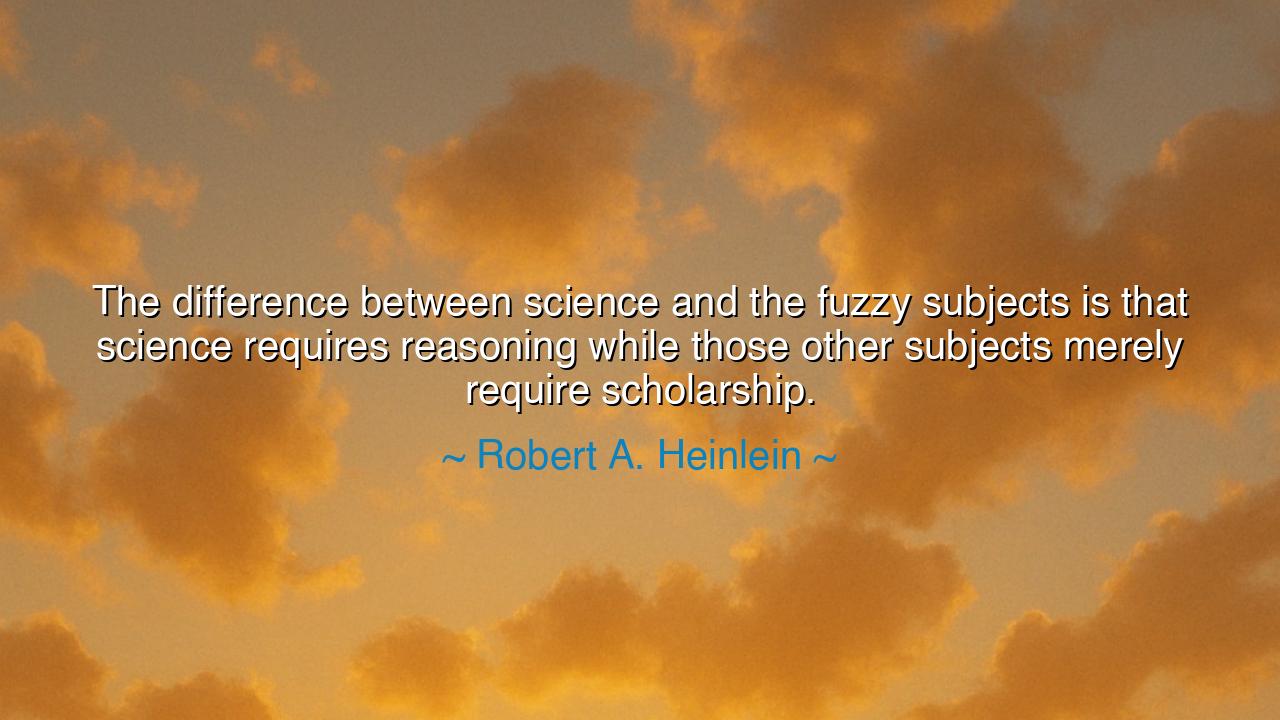
The difference between science and the fuzzy subjects is that
The difference between science and the fuzzy subjects is that science requires reasoning while those other subjects merely require scholarship.






The difference between science and the fuzzy subjects is that science requires reasoning while those other subjects merely require scholarship. These words, spoken by the great Robert A. Heinlein, strike at the heart of what it means to seek truth in our world. Science, that noble pursuit of understanding the laws of nature, is not a mere accumulation of facts and figures, nor a mere mastery of what has been written. It is an intellectual forge, where reasoning is the hammer, and logic the anvil, shaping the raw materials of curiosity into sharp insights. In contrast, the fuzzy subjects, the humanities and the arts, demand a different kind of mastery, one that does not always require the same depth of reasoning but rather the grace of scholarship.
It is not that one is superior to the other, for each serves its own purpose, but Heinlein’s words remind us that science is a discipline of the mind that challenges us to question and to think, not simply to memorize and repeat. When a scientist stands before the mysteries of the universe, whether in a laboratory or in the vast expanse of space, they are not simply compiling knowledge; they are crafting hypotheses, testing theories, and deducing conclusions from evidence. They reason through the problem with the logic of a craftsman working with fire and steel, forging new truths from the raw ore of experience.
Let us recall the story of Isaac Newton, whose reasoning transcended the accumulation of knowledge in his time. Newton’s reasoning was not born of blind acceptance but of profound questioning. When he gazed upon the falling apple, he did not merely note the fact of its descent. He asked: "Why does it fall?" He did not accept the world as it was handed to him; he sought to understand the forces that governed it. His reasoning led him to the discovery of the laws of motion and gravity, which transformed the way humanity viewed the cosmos. He did not simply collect the wisdom of the ages; he forged new paths of understanding through the fire of reason.
In contrast, there are those who seek to scholar the past, who collect the fragments of what others have left behind, and who carry the torch of history and culture through the ages. These pursuits are noble in their own right, for they preserve the fabric of human experience. But Heinlein calls us to recognize the difference between the scientific method, which requires the rigorous application of reasoning, and the disciplines that require the mere scholarship of facts. It is one thing to gather knowledge from the pages of history, and quite another to challenge the assumptions of the world and seek knowledge through the crucible of intellectual labor.
The story of Charles Darwin offers a powerful example of this difference. As he sailed on the Beagle, Darwin was not merely gathering data on the species he encountered; he was thinking critically about the implications of what he saw. His theory of evolution was not a simple collection of facts; it was a product of deep reasoning, a hypothesis formed through careful observation, experiment, and, above all, logical deduction. His insights were not handed down from the elders of his time—they were forged through the fires of critical thinking, in the very furnace of his intellect.
And so, the lesson is clear, my children. Science calls us to engage with the world in a way that requires more than passive knowledge; it calls us to use our minds as instruments of inquiry, to question, to reason, and to deduce. It is a path of reasoning, where every answer leads to new questions, and every discovery challenges us to think even deeper. In our pursuit of knowledge, we must not settle for mere scholarship—the collection of facts and the repetition of established truths—but strive to be like the great minds of history who shaped the world with their reasoning.
What, then, should we do in our own lives? In every pursuit—whether it be in the sciences, the arts, or the humanities—let us never stop at mere knowledge. Let us apply the sharp blade of reasoning to all that we encounter. In your studies, do not merely memorize; seek to understand. Ask questions, challenge assumptions, and engage deeply with the material. In your work, apply the same critical thought to every decision you make. Whether you are a scientist, an artist, or a philosopher, remember that true mastery comes not from the accumulation of facts, but from the ability to reason through them and forge new paths forward.
Thus, we are called to a higher way of learning—a way that does not accept the world as it is, but strives to understand it, to challenge it, and to push its boundaries ever outward. In this, we fulfill the true purpose of knowledge: not to gather dust, but to illuminate the darkness and lead humanity ever closer to the truth.






AAdministratorAdministrator
Welcome, honored guests. Please leave a comment, we will respond soon